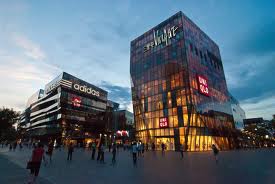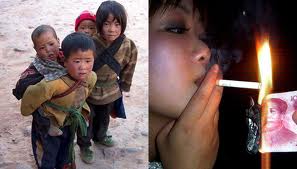Great goods from you, man. I’ve understand your stuff previous to and you’re just too excellent.
The Spambots love me. They really, really do.
The Spambots love me. They really, really do.
Here is Beijing Spirit (as codified in a subway display ad):
Patriotism. Innovation. Inclusiveness. Virtue. Quite apart from the questions of who developed this formula, what the public purpose is, and whether anyone in the citizen audience for such encouragement pays even the remotest attention (and indeed, whether there is any reason that they ought to), I found this intriguing. I thought about this on several long walks between subway lines, and sandwiched among my fellow humans who were Going Places on the Beijing Metro.
I am all for sane and non-toxic forms of patriotism. I still love me some Canada as I learn to love the world.
Innovation is a grand thing, the yang to tradition’s yin. (Or vice versa.) Bring on the new; in China, for all its reverence for the 5000 years of civilization, change is a high-speed train. Wisdom is needed to keep it on the rails.
It’s hard to see any dark side to inclusiveness, so long as it’s about more than holding one’s nose in tolerant contempt – say, for the migrant workers who build the luxury highrises and supermalls – or smiling for the foreigners who buy and spend, and then muttering darkly about them in private.
Virtue seems such a quaint idea, and is all the more lovable and necessary for it. Chinese respect for virtue runs deep, and let’s hope it’s a renewable resource in this furiously competitive, deeply wary society.
Think. Ask. When does patriotism collide unkindly with virtue? Can it co-exist with inclusiveness? Must virtue and innovation be at odds, or can there be new and creative expressions of the truly and deeply good? (Pray for ‘yes’.)
These are thoughts from an afternoon on several subway lines.
I went to Beijing and all I got was this gorgeous chocolate…
I wrote recently about the extremes of wealth and poverty that may, at a certain level of unremitting seriousness, be the essence of professional sport. Sport is not the reason I came to Beijing, but here I am, in one of the Chinese capital’s many little shrines to conspicuous wealth.
SanlitunVillage. I assume there must have been a village here once, but now it’s something rather other: sexy Adidas megastore with giant photos of a steely-eyed David Beckham; Godiva Chocolates, where I lost

The shopping heart of Sanlitun, from the street. The “bar street” is to the right, Soho luxury highrises are behind and to the left of us, and spending is dead ahead.
my mind and my dietary determination just twenty minutes ago; Starbucks, naturally; McDonald’s, ubiquitous and inevitable, but almost shamefaced in the basement among the more glittering expressions of European, American and Chinese wealth; a Megabox cinema (five posters of a kneeling, battered and helmet-less Robert W. Ironman are leering at me as I write, but I ain’t goin’); and, off to the side, “Sanlitun Bar Street” which I walked towards after leaving Godiva’s in a chocoholic swoon – two quick solicitations for “lady bar, mister? lady massage?” got me back into the den of conspicuous consumption and away from the pits of addictive loneliness. Ah, escape.
Albert Schweitzer (1875 – 1965) was a Christian theologian and medical missionary in Africa (in what is now known as Gabon). He won the Nobel Peace Prize in 1952 because of the above, off-the-beaten-path but eminently Christian philosophy. This may the heart of all true and useful religion. Was he his “brother’s keeper”, a la Jesus Christ, practising the Buddha’s “right action”, and applying Baha’u’llah’s injunction to “carry forward an ever-advancing civilization”? He tried.
I have known for most of my life, at least in a shallow way, that extremes of wealth and poverty are toxic to world unity and peace. The Baha’i teachings have insisted on their elimination for something close to 150 years. I accepted the tenet as fact – alongside the necessities of defusing all prejudices, widening all loyalties, and rethinking all assumptions – as an idealistic young man, no more than a boy, really.
During my privileged, Canadian-born lifetime, the gap between rich and poor has only widened, and now I live in a country hell-bent on leading the world in this dubious marker of development. (My understanding is that the Excited States of America is still in front by a nose, but China and Brazil are

Sorry, this is a bit graphic. Yes, that is Chairman Mao on the 100-yuan note, China’s largest denomination (about seventeen bucks Canadian). Families live on that for a month.
closing fast. To the winner goes the spoiling, the rot, the instability, but the runners-up will know it, too.) Lately, I’ve been brooding on the reasons for my steadily – sometimes violently – growing disillusion with sports, at least at the pro level.
Stratospheric salaries for the best horse-hide whackers and roundball bouncers (and all their sweaty peers) are, of course, a cliché these days. Spaniard Pau Gasol of the Los Angeles Lakers will make $19 million next season, and he’s far from the highest-paid jock. I made a good and steady North American income for nearly 30 years, and my take was somewhere between a mil and $1.5 million, I figure. Such comparisons are so banal that nobody really talks about it anymore, which is why I just did.
Edward Gibbon (1737 – 1794)was an English historian, most famous for The History of the Decline and Fall of the Roman Empire. To be entirely self-centred, I’m not sure if this quote tells me more about my lack of understanding or my dropping out of genius school. It does remind me that nobody can do my most important work — whatever that is — but me. This idea may express an outdated, super-individualistic view of exceptional accomplishment, and it might not.
William Cowper (1731–1800). Cowper’s is a name that I knew from hymnals in our little Baptist Church when I was a child. I hadn’t known he was responsible for this line, which adorned the masthead of my little home town’s weekly Grand River Sachem, and may yet. It is likely inspired by the Gospel of John, in which Jesus says, “Ye shall know the truth, and the truth shall set you free.”
Cowper was also a noted poet and occasional madman, in addition to his writing of Christian hymns. “God moves in a mysterious way, / His wonders to perform; / He plants his footsteps in the sea, / And rides upon the storm” is a Cowper lyric. So is this familiar line from a poem I’d never heard of: “Variety’s the very spice of life, / That gives it all its flavour.” Good job, Bill!
Ill-fated ‘80s music duo? Fast-food lunch combo? Bachelor grocery list?
The answer is D) None of the above. Here are some notes about two bits of news that might be meaningful to you if you have both a mildly unhealthy appetite for basketball and a streak of Chi-curiosity. They are about two ballplayers whose careers will likely never come in direct contact, yet which are bizarre mirror images of each other.
T-Mac, of course, is Tracy McGrady, the former NBA scoring wizard who spent last season in what was, to some, a startingly unimpressive late-career stroll through a season with the Qingdao Eagles of the Chinese Basketball Association. Tang is T-Mac’s basketball opposite, a teenaged hoops prodigy from Jiangsu province who went to the United States for high school so that he could be a student and an athlete. Tang Zihao is called Chris Tang in the States, Chris for the point guard’s sporting hero, Chris Paul, and Tang as in the powdered sugary-orange drink, not as it’s pronounced back home in southeastern China.
I’d read about young Mr. Tang in an excellent December feature by Jay Caspian Kang of Grantland. The 6’3” guard was mid-way through his junior year of high school at Oak Hill Academy in Virginia, after having dominated at another school in his first two high school seasons.
I woke to a small explosion this morning, a mother-son dispute about laptop use. We worry about how compelling is our young teen’s attachment to headphones, computers and his PDA. Our little sense of post-dawn peace was – well, I can’t say shattered, just can’t, because my own little electronic window just told me about Boston.
When you love sport as I do, there is something especially horrible when evil visits the home court of dreams and persistence and the desire to surpass oneself, one of the places we go to believe in human goodness and greatness. This year’s Boston Marathon, 26.2 miles of tradition, where Tom Longboat brought honour to his Grand River people and thousands have found deeply personal victory, was dedicated to the 26 who died at the Sandy Hook elementary school. Now there is disbelief and pain where there should be only exhaustion, exhilaration and the giving of one’s all.
Katherine Switzer (1947-), the first woman to run in the Boston Marathon. Today, a bitter cast to this gorgeous quote, as the 2013 marathon saw several die, many more injured, who had done exactly what the indomitable Ms. Switzer had recommended.